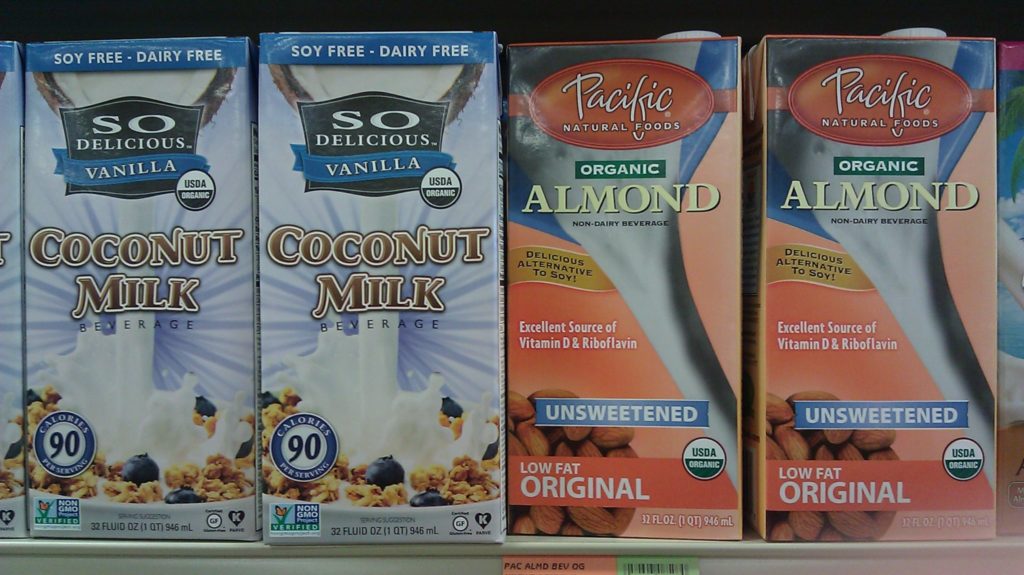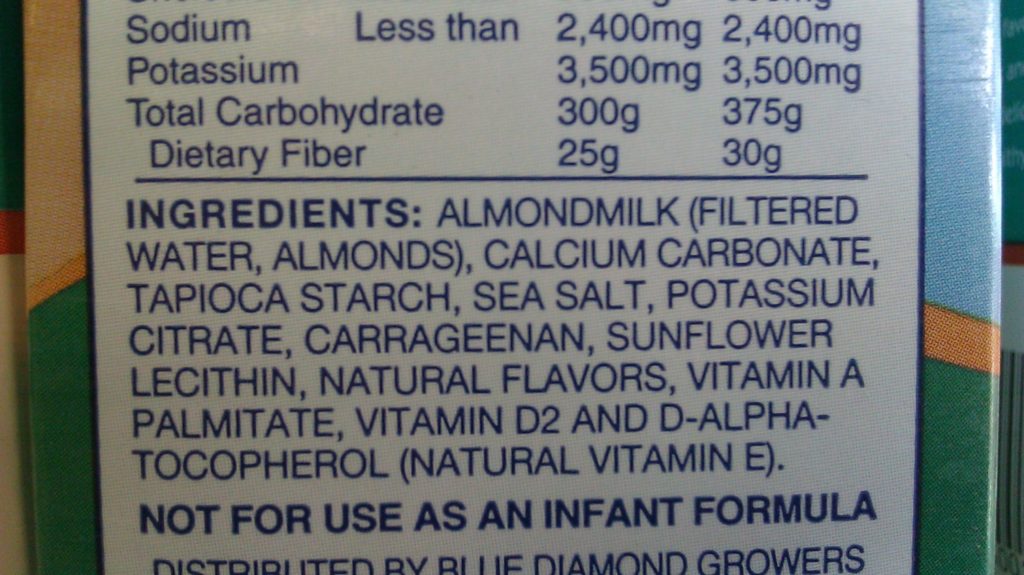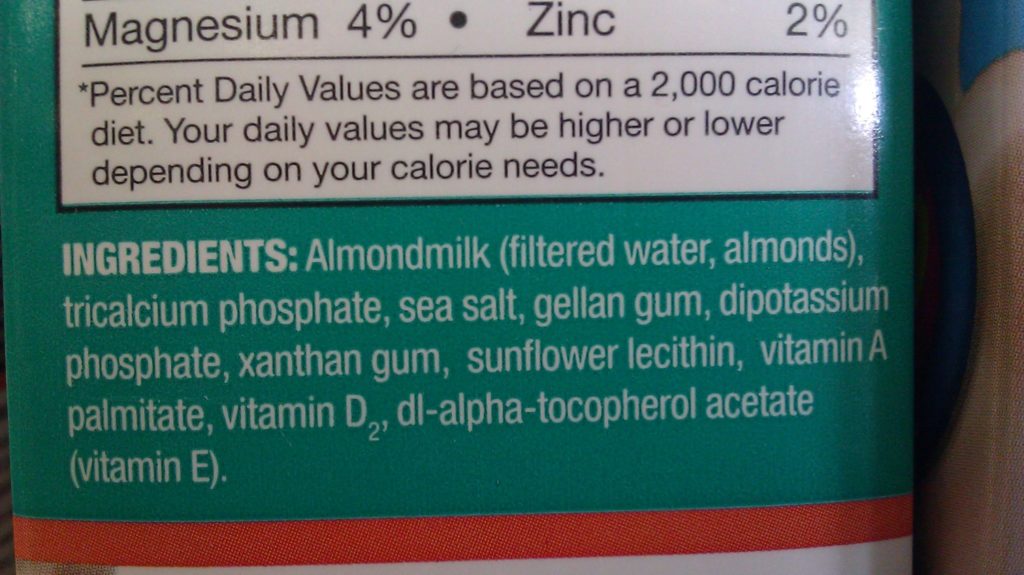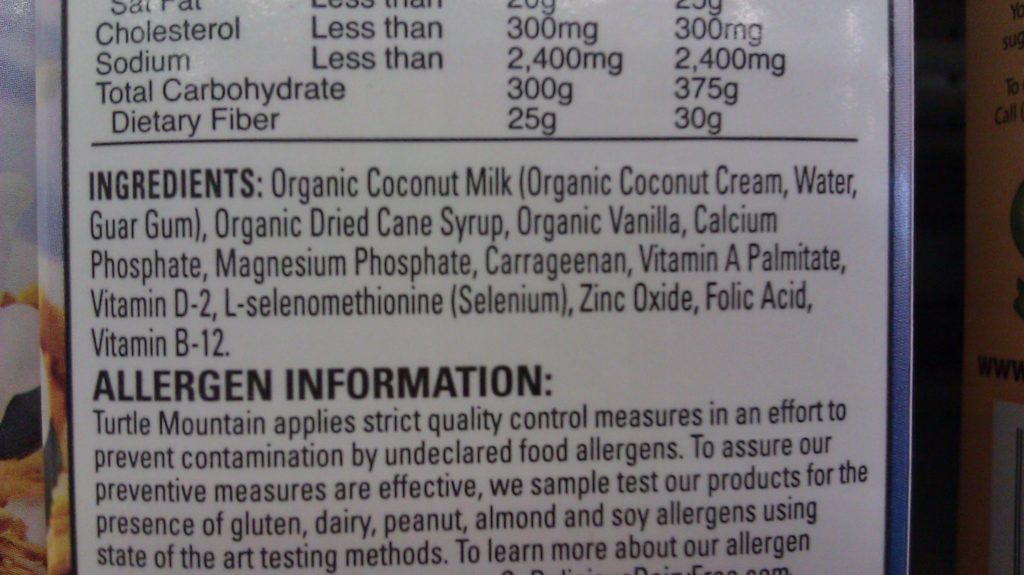 Organic coconut milk and almond milk are common purchases at the health food store by those with dairy allergies. Usually, these people are savvy consumers who know enough nutritionally to avoid soy milk with its endocrine disrupting isoflavones and gastric inflaming phytates. Rice milk is also steadily declining in popularity as it is really not much more than a glass of sugar water nutritionally speaking.
Organic coconut milk and almond milk are common purchases at the health food store by those with dairy allergies. Usually, these people are savvy consumers who know enough nutritionally to avoid soy milk with its endocrine disrupting isoflavones and gastric inflaming phytates. Rice milk is also steadily declining in popularity as it is really not much more than a glass of sugar water nutritionally speaking.
Organic, unsweetened coconut milk and almond milk in cartons seem like great alternatives at first blush, but are they really as “healthy” as people believe?
Let’s take a look at the labels. I was shocked at what I found.
Check out the labels of the three brands I photographed. I checked all the brands, by the way, and they all contained the same dangerous additives I’m about to describe.

First, Vitamin A Palmitate is added, the synthetic version of Vitamin A. I personally avoid synthetic versions of Vitamin A like the plague. Every single multi-vitamin I’ve ever examined contains some form of synthetic A, including the so called “whole foods” multis.
Synthetic vitamins are the chemical mirror images of the real, natural versions. They can cause imbalances over time. Even small amounts of the synthetic fat soluble vitamins like Vitamin A can prove toxic and should be strictly avoided!
The Organic Consumers Association warns that isolated vitamins such as those produced synthetically cannot be recognized or metabolized by the body in the same way as the natural version.

Large doses of natural vitamin A are well tolerated by the body as established by researchers decades ago, however. Traditional diets contain 10 times or more of the RDA of this nutrient with no ill effect. However, synthetic vitamin A is associated with birth defects and bone fractures. It has no benefit in the diet whatsoever.

The second really bad additive in these organic cartons of coconut milk and almond milk is Vitamin D2. Vitamin D2 is a form of the wonder vitamin that you should take great pains to avoid.
In all known cases of Vitamin D toxicity where the dose was intentional, Vitamin D2 was the culprit. By comparison, Vitamin D3 is much less toxic and requires an enormous or even an accidental dose to produce any toxic effect.
Vitamin D2 is manufactured industrially by irradiating yeast. It is dangerous for D2 to be added to any food product particularly if this product would be given to children, where toxicity symptoms would appear at much lower dosages.
None of the store brands of cartoned coconut milk or almond milk were free of these dangerous and synthetic versions of the fat soluble vitamins!
Notice also that carrageenan is present in 2 of the 3 products as well! Dr. Andrew Weil has been telling people to avoid carrageenan since 2002.
Carrageenan is so toxic and inflaming to the human digestive system that this food additive is formally classified by the International Agency for Research on Cancer (part of the World Health Organization) as a potential human carcinogen.
In my view, it would be a mistake to purchase and consume these items. They are in no way health promoting or beneficial, particularly for growing children!
Healthy Alternatives to Coconut Milk and Almond Milk in Cartons
Coconut milk and almond milk should be healthy and they can be if they are produced at home without these dangerous additives. I wrote an in depth post on how to easily make these nondairy beverages yourself. This recipe for wild rice milk is a good option as well.
Believe it or not, even organic coconut milk in BPA free cans would be a better alternative to cartons of coconut milk based on my label inspection!
Check out my video on homemade coconut milk and my article on how to make healthy DIY almond milk, fermented to add probiotics and enzymes to boost immunity and improve digestion.
Sarah, The Healthy Home Economist
Sources
From Seafood to Sunshine: A New Understanding of Vitamin D Safety







Hey Karen, here is a classic example of listening to people that have no clue or scientific backround to what they are saying. Carrageenan is NOT msg. MSG, is MSG. Carrageenan is seaweed that has been used over the past 20 years. It was never an issue, until people started “blogging” about the wrong Carrageenan! There are 2 different types, ungraded and graded. Now of course, everyone now says that even the food grade Carageenan causes them tummy aches and still don’t like it. Do you know most Organic Assiciations still back Carageenan up, aling with the FDA after doing numerous studies on it as recent as 2012? Do your research, get your information from a credible sources. People will ALWAYS have an issue with an ingredient in anything. It’s a joke, just like people thinking or “been told” that MSG is another name for natural flavor. Lol. Natural flavor is a brands “secret recipe” that makes the product unique, so it’s not easily copied. I’m going to only listen to credible sources from now on and a “blogger” is defenitly NOT one.
Most of those premade nut milks have carrageenan in them. From what I was told…carrageenan is another name for MSG. Yikes!
WHAT IS YOUR VIEW ON THIS STUDY?
Oct. 28, 2009 – Boston University School of Medicine researchers (BUSM) have found that 50,000 International Units (IU) of vitamin D2, given weekly for eight weeks, effectively treats vitamin D deficiency. Vitamin D2 is a mainstay for the prevention and treatment of vitamin D deficiency in children and adults. Continued treatment with the same dose of vitamin D2 every other week for up to six years after the initial eight-week period prevents vitamin D deficiency from recurring with no toxicity.The BUSM study appears online in the journal Archives of Internal Medicine.
Vitamin D is essential for strong bones because it helps the body absorb calcium and phosphorus from the food we eat. Vitamin D deficiency can lead to rickets in children and the painful bone disease osteomalacia in adults. Vitamin D deficiency can also cause osteoporosis and has been linked to increased risk of cancer, heart disease, diabetes, autoimmune diseases and infectious diseases including influenza, according to senior author Michael F. Holick, PhD, MD, director of the Bone Healthcare Clinic and the Vitamin D, Skin and Bone Research Laboratory at Boston University School of Medicine.
Of the 86 patients researchers studied, 41 patients who were vitamin D deficient received eight weeks of 50,000 IU of vitamin D2 weekly prior to starting maintenance therapy. For those patients, the mean pre-treatment 25-hydroxyvitamin D status (25(OH)D) level was 19 ng/ml, which increased to 37 ng/ml after eight weeks of weekly therapy. These patients were then treated with 50,000 IU of vitamin D2 every other week and had a mean final 25(OH)D level of 47 ng/ml.
For the 45 patients who received only maintenance therapy of 50,000 IU of vitamin D2 every two weeks, the mean pre-treatment 25(OH)D level was 27 ng/ml and the mean final level was 47 ng/ml.
“Vitamin D2 is effective in raising 25(OH)D levels when given in physiologic and pharmacologic doses and is a simple method to treat and prevent vitamin D deficiency,” said Holick, who is also director of the General Clinical Research Unit and professor of medicine, physiology and biophysics at BUSM. “While treating and preventing vitamin D deficiency, these large doses of vitamin D2 do not lead to vitamin D toxicity.”
According to Holick, this is the first study demonstrating the efficacy of a prescription therapy to prevent vitamin D deficiency longterm in routine clinical practice.
Quest Diagnostics, the nation’s leading provider of diagnostics testing, information and services, analyzed the specimens used in the study.
I briefly scanned the study and do not know what the purpose of it was considering that Vitamin D2 is inferior to Vitamin D3 which is what we actually produce and use in our bodies. You get Vitamin D3 when you are in the sun for 10 minutes (100% DV).
Vitamin D2 is for the most part synthetic in most of these fortified products so if anything if someone is suffering from a Vitamin D deficiency, they need to be taking Vitamin D3 or getting some daily sun – 10 minutes max…we’re not talking about baking out in the sun without sunscreen but the sun is the only way to make natural vitamin D.
I don’t know what the absorption rate for vitamins is for fortified products but the Vitamin D they use for dairy alternatives/dairy is not sufficient considering they use Vitamin D2 and also because it is synthetic. This is not the case where… it’s better to take it than not. These companies have been misleading the public for too long…even if it is a healthier brand like “Silk” or “Blue Diamond”.
Because the D2 added to processed foods is synthetic and not the same as natural D2.
Her perspective on Vit A is off – Vit A Palmitate (or preformed Vit A) is actually well-recognized by the body and processed in the small intestine in a very efficient process that is not subjected to feedback regulation, so when you’ve gotten too much it won’t shut down. Whereas, the processing of Provitamin A (beta-carotene) requires it be broken down prior to absorption and this is a highly regulated process controlled by feedback from the body’s stores of Vit A. Chronic toxicity has been associated with daily ingestion of 10x the RDA over a long period of time and acute toxicity with >200x the RDA. That is a lot of coconut/almond milk!!
As for Vitamin D2… It is certainly known to be a lesser quality supplement that Vitamin D3. However, I don’t feel that the evidence supports it being considered a villian. It is not as bioefficacious at binding as D3 and can be available more often in the free form. This is what makes it more at risk for causing toxicity. However, I found no evidence to support her claim that “all” intentional Vit D dosing toxicity cases were caused by Vit D2 (“ALL” is a very strong word). Also, I found nothing to suggest that D3 was significantly safer supporting her alleged claim that it “requires an enormous or even an accidental dose to produce any toxic effect.” Vitamin toxicity is not a black and white issue and there is no well-accepted threshold of any supplement in medicine. Here is a link to a very good peer-reviewed journal article on the topic of D2 v. D3: http://ajcn.nutrition.org/content/84/4/694.full The author argues against the use of D2 as a supplement due to it’s lesser quality and stability not because it is necessarily harmful.
signed,
Physician-Against-Biased-Blogging, MD
I drink both Almond Milk (Blue Diamond 40cal), and Coconut milk (So Del. Organic 45cal) from 950ml tetra packs.
Neither contain ANY added vitamins at all (0%)
I’ve been giving my 14 month old daughter silk almond milk for two months now and just purchased so delicious coconut milk last night to mix with her almond milk. She can’t have lactose and besides that I am trying to avoid cows milk due to all of the growth hormones and antibiotics used on cows. I thought I had found a healthy option with the almond milk but apparently not.. is there a healthy option to purchase??
that’s why I am suggesting we stop kibbitzing and go directly to the manufacturer and ask that they remove the added crap none of us want..VIt A palmitate for sure..eve Mercola hates the stuff.
Good Post Since I’m a Personal Trainer I Started Telling My Clients About It. They Love Me even more now. BUT IM A RAW MILK ADVOCATE NOTHING BUT RAW MILK IN MY HOUSE RIGHT DOWN TO THE BABY. GOOD INFO
It’s in fact very complicated in this active life to listen news on TV, therefore I simply use web for that purpose, and take the most up-to-date news.